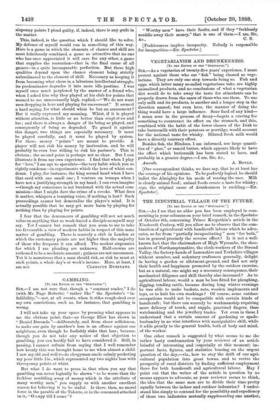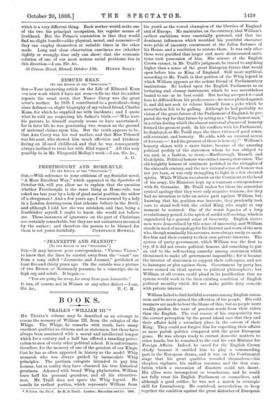THE INDUSTRIAL VILLAGE OF THE FUTURE.
[To THE EDITOR OF THE "SPECTATOR."]
Sia,—As I see that no abler pen has been employed in com- menting in your columns on your brief remark, in the Spectator
of October 6th, concerning Prince Kropotkin's article in the Nineteenth Century, will you allow me to observe that the com- bination of agricultural with handicraft labour which he advo-
cates, so far from "partially incapacitating" men "for both," has in general precisely the reverse effect ? Is it not a well- known fact that the chairmakers of High Wycombe, the shoe- makers of Northamptonshire, the cloth-workers of the Stroud Valley, the factory-hands of Lancashire and Yorkshire villages without number, and sedentary craftsmen generally, delight in having a garden or allotment-ground, and find not only their health and happiness promoted by the outdoor exercise, but as a natural, one might say a necessary consequence, their mechanical diligence and skill thereby also increased? As to- agricultural labour, would a man be less fitted for ploughing, digging, tending cattle, because during long winter evenings he was able to make baskets, nets, wooden implements and toys, or to knit his own stockings ? Of course, some outdoor occupations would not be compatible with certain kinds of handicraft ; but there can scarcely be workmanship requiring, more delicacy of touch, and supple, practised fingers, than watchmaking and the jewellery trades. Yet even in these I understand that a certain amount of gardening or spade- husbandry in no wise interferes with manipulative skill, while it adds greatly to the general health, both of body and mind, of the worker.
One other remark is suggested by what seems to me the rather hasty condemnation by your reviewer of an article brimful of interesting and (especially at this moment) im- portant facts, figures, and statistics bearing on the urgent question of the day,—viz., how to stay the drift of our agri-
cultural population into great towns, and to revive the prosperity of rural districts by finding sufficient employment there for both handicraft and agricultural labour. May I point out that the writer of the article in question by no- means appears to advocate, as your reviewer seems to think,. the idea that the same men are to divide their time pretty equally between the indoor and outdoor industries? I under- stand him simply to contend for the possibility and expediency of these two industries mutually supplementing one another,
which, is a very different thing. Each worker would make one of the two his principal occupation, his regular means of livelihood. But the Prince's contention is that they would find no slight benefit—alike physical, moral, and economic—if they can employ themselves at suitable times in the other mode. Long and close observation convinces me (whether lightly or wrongly, time only can show) that the economic solution of one of our most serious social problems lies in this direction.—I am, Sir, &c.,
.30 Craven Street, Strand, October 13th. HENRY SOLLY.



































 Previous page
Previous page